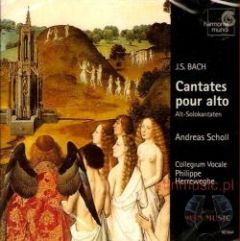Bach - Cantates Pour Alto BWV 35, 54, 170 (1998)
Bach - Cantates Pour Alto BWV 35, 54, 170 (1998)

Vergnügte Ruh, beliebte Seelenlust, BWV 170: 1. Aria "Vergnügte Ruh! beliebte Seelenlust!" 2. Recitativo "Die Welt, das Sündenhaus" 3. Aria "Wie jammern mich doch die verkehrten Herzen" 4. Recitativo "Wer sollte sich demnach" 5. Aria "Mir ekelt mehr zu leben" Widerstehe doch der Sünde, BWV 54: 6. Aria "Widerstehe doch der Sünde" 7. Recitativo "Die Art verruchter Sünden" 8. Aria "Wer Sünde tut, der ist vom Teufel" Geist und Seele wird verwirret, BWV 35: 9. Concerto 10. Aria "Geist und Seele wird verwirret" 11. Recitativo "Ich wundre mich" 12. Aria "Gott hat alles wohlgemacht!" 13. Sinfonia 14. Recitativo "Ach, starker Gott, laß mich" 15. Aria "Ich wünsche nur bei Gott zu leben" Andreas Scholl - Contre Tenor Markus Markl - Orgue Marcel Ponseele - Hautbois Collegium Vocale Orchestra Philippe Herreweghe – director
Three of Bach's four cantatas for solo alto were written within the period of a few months in the year, 1726. It is surmised by musicologists that they were written for a specific singer, for they are very difficult, and not easily sung by the moderately skilled personage. There are strenuous technical demands on the vocal and expressive qualities of the singer, who must be an accomplished coloratura capable of expressive cantible singing as well as possessing accurate intonation. A female or a castrato voice were out of the question, but a high falsetto was not.
German theological tradition reaching far back into the 17th century endowed each of the 4 human voice types with symbolic connotation. The theologian Theodor Schneider writes:"The bass is appointed/that was the belief/to be seen by Jesus/who is the basis and foundation of our salvation; you Descants/trebles,sopranos/soar on high/and thus/let your prayer penetrate the clouds/and do not erase/until you reach the Almighty Trinity; see/they open up the roof on high and set poor man down before the feet of the Lord Jesus; the Holy Ghost himself bore the Alto(s) and caused them/if not with their mouths/ yet with their hearts to cry: Jesus/ you Son of David/have mercy on us!" The alto was accorded the voice of the Holy Ghost. All three of these cantatas are very attractive and quite interesting.
The first cantata: BWV170(20min) 'Vernugte ruh, belebte Seelenlust' (Contented rest, beloved heart's desire)opens to a lilting melody, not unlike 'Jesu, Joy of Man's Desiring' The first aria bears the name of the Cantata and is possessed of an irreistible melody; so popular among countertenors that it has been recorded many times (my favorite Michael Chance on Gardiner's SDG vol 4 recording).
Strings hail the opening of the second cantata: BWV 54 'Widerstehe doch der Sunde' (Pray resist all sin); it is the shortest of the three on this disc(11min). In terms of color it opens with dark tones, forewarning the message of the text. Cantatas BWV 35 and 170 deal with the theme of resurrection and the preference of death against living in the painful world (and Bach had much pain and death in his life) without the presence of God; the alto in this work bids us to be strong in the face of transgression.
The third cantata BWV 35 'Geist und Seele wird verwirret' (Mind and spirit are bewildered) demonstrates Bach's ability to marry text to music successfully as the msuic tells of the mind-boggling effect of God's creation and wonder.
Scholl's voice is full and focused and being German he is able to sing through each word, imbue it with correct meaning and able to string the words out to make beautiful phrases. In true Herreweghe style Scholl is accompanied with much grace and confidence by the Orchestre du Collegium Vocale, whose sound engineers secure excellent balance between orchestra and solo voice. --- George Peabody
download: uploaded anonfiles mega 4shared mixturecloud yandex mediafire ziddu
Last Updated (Tuesday, 06 August 2013 22:01)








